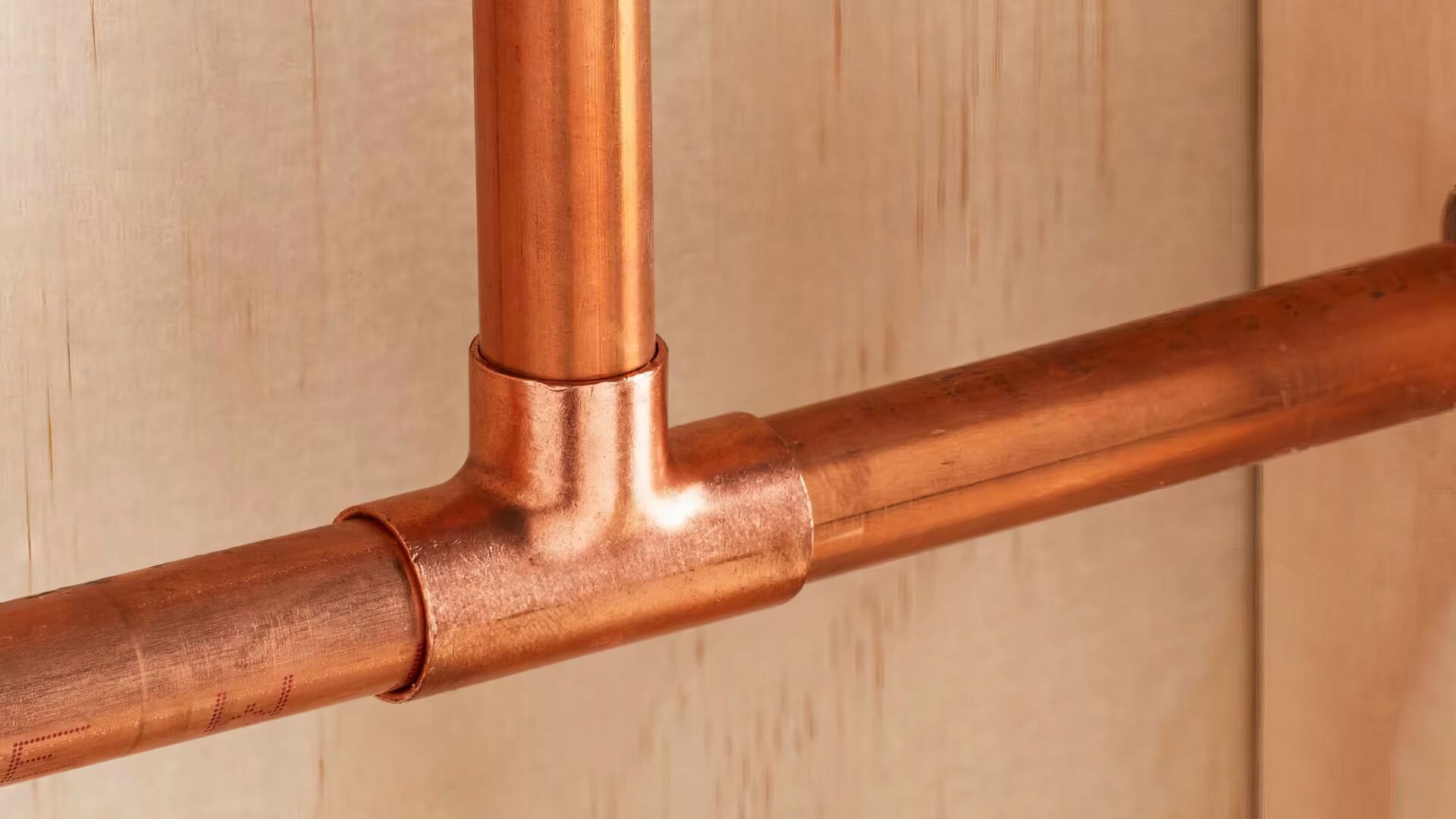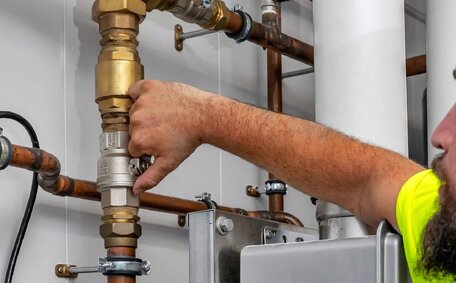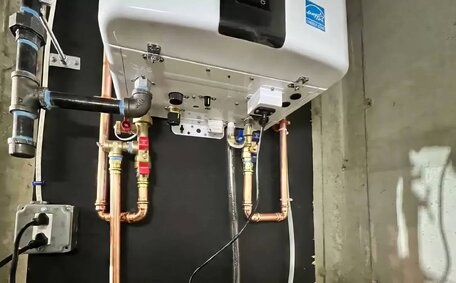Introduction to Pipe Relining
Pipe relining is a trenchless method for repairing damaged pipes without the need for excavation. This process involves inserting a resin-impregnated felt tube into the existing pipe and curing it to form a smooth, jointless pipe lining.
This article from the plumbing experts at Epping Plumbing will examine the minimum pipe diameters suitable for relining. We provide relining services for both residential and commercial plumbing systems in the Epping, Sydney area, including emergency situations.
As pipe diameters get smaller, the options for relining become more limited. This section will explore the implications of pipe diameter reduction, the range of sizes appropriate for relining, length constraints, and frequently asked questions - with a focus on overall effectiveness and service guarantees.
How Relining Impacts Pipe Diameter
The relining process involves inserting a resin-impregnated felt tube into the damaged pipe and inflating it to conform to the pipe walls. As the resin cures, it hardens into a smooth new pipe lining.
This relined pipe typically has an internal diameter around 6mm smaller than the original. However, flow rates are rarely affected since the new pipe lining has an exceptionally smooth surface that allows water to flow efficiently.
Quality relining materials like epoxy or polyurethane resins can adhere and conform to existing pipe bends, joints, connections and configurations with ease. An experienced plumbing professional will select the optimal relining material and thickness to match each unique pipe system.
So while relined pipes may be slightly narrower, the smoothness and durability of quality relining materials preserves normal flow rates in most residential and commercial plumbing systems.
Minimum and Maximum Pipe Sizes for Relining
Pipe relining can be performed on pipes with inside diameters ranging from 40mm to 225mm. This encompasses common residential plumbing pipe sizes like 50mm for bathroom sinks, 80mm for kitchen sinks, 100mm for main sewer lines, and 150mm for stormwater drainage.
For commercial plumbing systems, pipe relining can handle the larger diameters used - up to 225mm. This includeshrader valves, main drains, fire system pipes and more.
Within this 40mm to 225mm size range, pipe relining is viable for:
- Both horizontal and vertical pipe alignments
- Round, rectangular or other pipe shapes
It’s important any residential or commercial relining work in the Epping region complies with applicable plumbing codes and standards. An experienced, licenced plumbing contractor like Epping Plumbing will ensure all relining materials, curing times, safety factors and mechanical properties align with regulations.
By following codes and best practises, quality pipe relining guarantees can be provided even at the minimum and maximum size thresholds. Proper installation is key to preventing post-relining issues involving flow rates, leakages or strength failures.
Addressing Length Limitations in Relining
When it comes to pipe relining projects, one key consideration is the maximum length of piping that can be lined in a single process. Thanks to advanced materials and installation methods, relining lengths can now exceed 50 metres in many situations.
However, several factors affect the feasible relining length for a given project:
- Extent of damage - Severely corroded pipes over long sections may need staged relining work.
- Pipe configuration - Complex pipe routes with multiple bends add logistical constraints.
- Pipe diameter - Larger diameters allow longer relining lengths.
- Relining material - Epoxy resins generally enable longer sections than other products.
As seasoned plumbing professionals, Epping Plumbing will assess these variables and determine the most viable relining approach. We utilise specialised one-piece junction liners to navigate pipe bends, junctions and transitions that often impede lengthy relining work.
With meticulous planning and preparation, our expert team can execute single-run relining in excess of 50 metres in suitable straight pipe sections. We also provide staged relining on longer, complex pipe systems to guarantee reliable results throughout.
Contact Epping Plumbing to learn more about managing length constraints for your residential or commercial relining project. With the right strategy, virtually any piped system can be restored via trenchless relining methods rather than disruptive pipe replacement.
Frequently Asked Questions
Here are answers to some of the most common questions we receive about pipe relining and minimum diameter considerations:
What materials can be relined?
Pipe relining is effective on old piping made from materials like cast iron, galvanised steel, copper, concrete and clay. Modern ABS, PEX or PVC pipes don’t require relining.
How do you determine if a pipe is large enough to reline?
Our technicians will perform a video inspection to accurately measure the pipe’s diameter and condition. In general, pipes of 40mm to 225mm can be relined, covering most residential and commercial sizes.
Why does a pipe observed to be over 40mm appear too small to reline?
If significant corrosion, offsets, damage or blockages exist, the available space for inserting the relining tube may be too narrow despite technically meeting the minimum diameter. Each situation is unique - our team will advise if relining is possible after thorough pipe inspections.
Can you reline rectangular or oval-shaped pipes?
Yes, pipe relining works on round, rectangular and other non-standard pipe shapes so long as the minimum interior dimensions allow fitting the liner tube.
What determines the length limits for pipe relining projects?
The length able to be relined depends on pipe material, diameter, configuration and extent of damage. Under optimal conditions, we can reline over 50 continuous metres. Complex projects may require staged relining.
Contact Epping Plumbing to explore all your options for residential or commercial relining needs. Our specialists are happy to answer any questions about minimum pipe diameters or other aspects of trenchless pipe renewal.
Pipe Relining vs. Replacement
When ageing or damaged pipes reach the lower thresholds of pipe diameters suitable for relining, homeowners and businesses may debate between relining or full replacement.
For small pipes around 40-50mm, replacement often costs $250 or more per linear metre - significant expenses arise from the excavation, new piping, backfilling and surface reinstatements needed.
Meanwhile, pipe relining typically ranges from $130 to $200 per metre installed. Other key advantages are:
- Minimal property disruption without trenching requirements
- Preserves surrounding structures and landscaping
- Lined pipes retain flow efficiency despite slight diameter reductions
However, relining has more risks for the smallest pipe sizes. If the existing pipe condition is too deteriorated or blocked, inserting the resin liner may be unfeasible. Additionally, any post-relining issues involving liner detachments, leaks or flow problems can necessitate full pipe replacements.
For pipe diameters bordering on the minimum threshold, Epping Plumbing will provide expert guidance. We determine relining eligibility through detailed pipe inspections and measurements. If replacement is the safer option, we will explain why and provide competitive quotes.
In many cases, we find creative relining solutions that avoid expensive and damaging pipe replacement - even when working in confined spaces. Contact our team to review your specific small pipe requirements.
Guarantees and Longevity
At Epping Plumbing, we stand behind our pipe relining workmanship with ironclad guarantees to deliver lasting solutions. All residential and commercial relining projects come with substantial warranties covering:
- 50-year structural guarantee on the integrated strength and water-tightness of the relined pipe
- 10-year guarantee on stopping leaks or infiltration within the relined section
- 5-year guarantee on maintaining flow efficiency without significant blockages or buildup
These guarantees provide peace of mind that potential issues stemming from pipe diameter reductions are covered. We also provide 1-year labour warranties should any defects arise requiring repairs.
these formal guarantees, our decades of pipe relining expertise gives us confidence in delivering extended service lives. Correctly installed pipe liners have proven durability spanning 50 years or longer before needing rehabilitation.
To sustain this longevity, we recommend having all plumbing systems, including relined pipes, periodically inspected and maintained as needed. Proactive maintenance helps minimise sediment buildup and identify potential problems early.
As a well-established, family-owned plumbing business serving Sydney since 2003, Epping Plumbing maintains an excellent reputation for providing reliable service and support to all your plumbing needs. We stand behind every job 100% - if you ever have issues with pipes we have relined, we will make things right.
Reach out to our team to discover more about our ironclad relining guarantees and maintenance plans for all your plumbing systems. Investing in proactive trenchless pipe renewal provides asset owners cost and environmentally friendly piping systems benefiting the Epping region for generations.
Making the Right Choice for Your Pipes
When facing repairs on ageing or damaged pipes, deciding between relining and full replacement can be challenging. Pipe diameter is a key factor determining which method is optimal.
For pipes bordering the minimum threshold around 40-50mm diameter, Epping Plumbing provides transparent guidance based on thorough pipe inspections. We determine if resin-based relining is feasible or if complete pipe replacement is the safer, more reliable option.
In many cases, we find innovative trenchless solutions to restore small diameter pipes without major property disruption or costs. Relining avoids expensive excavation, debris, and reinstatements associated with pipe replacements.
However, some situations with severe corrosion, blockages or complex configurations preclude viable liner insertion, particularly in confined spaces. If replacement is necessary, we explain why and provide fair quotes for efficiently restoring your plumbing system.
With over 19 years of robust local expertise, Epping Plumbing serves as a trusted ally for all your residential and commercial decisions regarding relining and replacement. Get in touch with our team to organise an on-site consultation and pipe assessment catering to all your plumbing concerns. Our qualified technicians will inspect the diameter, layout and condition of your pipes in order to recommend the ideal repair approach.
For small diameter pipes, minor diameter reductions from relining may be acceptable to avoid replacement costs and damage. We guarantee reliable installations and provide warranties up to 50 years. Ongoing maintenance sustains the longevity of restored pipes.
Every property presents unique considerations when managing ageing plumbing. Leverage Epping Plumbing’s extensive relining experience to ensure all your decisions for your pipes are well-informed and strategic. Email jobs@eppingplumbingservices.com.au or call 1300 349 338 to discuss your repair options in more detail.






